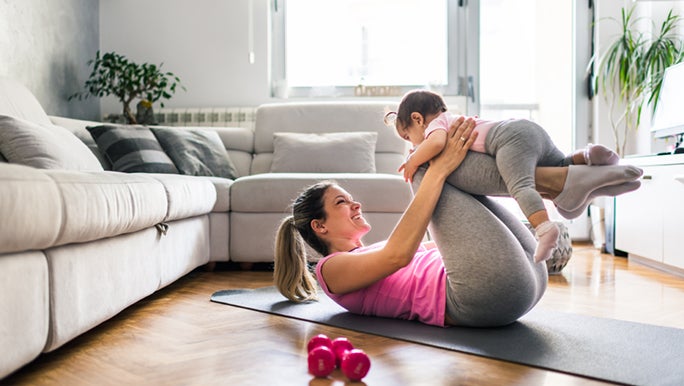Here’s a word for you – spuddle. It’s a 17th century verb that basically means to faff about a lot and achieve very little because you’re tired or your mind is elsewhere.
Have you ever felt so seen by a single word?
If you want to replace your spuddling with actions to be more productive in life, you’re in the right place. Consultant Psychologist Dr Bec Jackson, Accredited Practising Dietitian Shivaun Conn, and GP Dr Jill Gamberg share their tips to improve your concentration, focus and productivity.
How to be more productive (but not busy)
Do you ever feel like you’re on a hamster wheel and you just can’t get the wheel to stop spinning? You’re running furiously all day only to find your to-do list has somehow grown in length despite how hard you’ve been running. That’s because hamster wheels are made for hamsters, not humans.
It’s so easy to fall into the trap of “busy”. What was the answer you gave the last time someone asked how you are? Did you tell them you were busy? Perhaps the better answer should have been “drowning” or “unsure of exactly where my time goes even though I’m constantly doing things”.
Productivity isn’t actually about doing all the things. And when you do try to follow that misguided version of productivity, it can lead to exhaustion and burnout. You can’t remember if you took your medication, you aren’t coping with moving and all the things on your growing list. And some days you don’t know whether you’re coming or going. Not ideal, is it?
It’s also not about how to look productive. Because, what’s the point of looking productive if you aren’t actually achieving what you need to in a day?
If you really want to be more productive in life, you need to set yourself free from the busy trap.

If you really want to be more productive in life, you need to set yourself free from the busy trap.
The benefits of productivity
It’s a full-on world we live in. One in which we are constantly overwhelmed with information, says Dr Bec.
“Our brains receive 800 billion bits of information every day. But research suggests that we have the capacity to only deal with 14,000 bits. That’s such a tiny fraction.”
“What you focus on, or rather what you choose to focus on, really matters. You can easily find yourself caught up in unproductive things that don’t get you closer to your goals,” advises Dr Bec.
The real benefit of productivity isn’t that satisfying feeling of ticking things off a to-do list. Nor is it a badge of honour to wear with pride. No, the real benefit of productivity is that when you get things done that you need to do, you actually have time left for the things you want to do.
It’s those joy-sparking, energy-giving, things that make us happy that we want to spend our time on that make productivity so worthwhile. Whether it’s taking the kids to the park in the afternoon, having weekends to enjoy family time or heading out for dinner with your girlfriends during the week. Productivity gives you the freedom to enjoy them all. When you are more productive at work you can focus on other things you want for your family like how to eat more sustainably.
Other productivity benefits include:
- better feelings of accomplishment as tasks are completed faster
- increased profitability/cost savings for the business you’re working in
- higher levels of motivation to stay on the productivity train
Productivity is about personal growth and resilience. It’s about ensuring you are working in flow and smashing your to-do list. Whether it’s productivity at work or productivity to power through your list of chores, it all leads you to feelings of happiness and achievement.

Our brains receive 800 billion bits of information every day. But research suggests that we have the capacity to only deal with 14,000 bits.
Things that make you more productive – focus!
Productivity doesn’t just happen. You can’t wave a magic wand and instantly be more productive. Otherwise, everyone would do it.
Productivity also isn’t an exclusively “powered by coffee” proposition. In fact, Shivaun says that many people use coffee as a prop.
“If you’re having three to four cups of coffee a day to prop you up because you’re tired, that’s not sustainable for productivity. If you are relying on coffee, what are the underlying reasons? You aren’t going to get the long-term energy and focus you need to really be productive,” she says.
Because that’s what it’s about. Productivity happens when we focus. Specifically, when we focus on what’s important to get the job done.
Focus relies on being able to decide what is important, what’s not important and directing your energy in the right way. It means being able to say “No, I can’t do that today because this task over here is more pressing.”
That’s when the productivity magic happens. You are focused. You are on task. And you are powering through what’s in front of you.
Focus is a skill. It takes time to learn how to say no and identify the most important things from what is probably a very long list of tasks. But once you learn how to flex your focus muscle, you’ll be a productivity machine.

Focus relies on being able to decide what is important, what’s not important and directing your energy in the right way.
Simple steps to improve your productivity
In your journey to be more productive, there are some simple steps you can take to improve your focus and get things done. Specifically, Dr Bec suggests:
1. Practising mindfulness and being in the moment
When you are present you can hone your focus to where it needs to be. If you have other things in your mind, it becomes a battle between those other things and the task at hand.
2. Try meditation to train your awareness and attention
A simple five minute meditation at the beginning of the day can help you step into the moment to focus on what you need to do for the day.
3. Limit the distractions around you
Removing some of the stimuli from your environment – such as music, colleagues chatting or kids playing – can help. Try shifting to a quiet room or popping on headphones to block out the noise.
4. Get clear on your intention
What is it that you actually want to achieve? By setting an intention, thinking about and refining your goals, you can help to prime your mind for what you need to focus on.
5. Revisit any ‘interferences’ and work out a strategy to combat them
This could be as simple as turning off your desktop notifications for your emails.
6. Take regular breaks
Productivity doesn’t mean you are ‘on’ all the time. Set ‘focus’ time and ‘free’ time to ensure you are recharging your batteries.
7. Find a system that works for you and use it
You could use a planner, an app or a task list to document a schedule or manage your goals. Formalising your goals into a system can help to keep you accountable. Dr Bec calls these ‘personal operating systems’.
8. Watch for perfectionism and procrastination
These can be the enemies of productivity.
9. Attach value and meaning to what you do
This can help you stay on track. If you can’t find any value, ask yourself if it is worth doing.
Dr Jill also suggests tuning in to your body’s own rhythm.
“What time do you exercise best? What time is your most productive at work? What time is best for you to eat? Once you know the answers to some of these questions, you can start to schedule your life around them. Work with your body and your natural circadian rhythm,” Dr Jill says.
Shivaun adds that while you might feel too busy, don’t forget exercise as this can help to improve your focus. She says “The more you move, the more energy you actually get. The more you sit down in front of the computer, the more sluggish and tired you’re going to feel.”

“The more you move, the more energy you actually get. The more you sit down in front of the computer, the more sluggish and tired you’re going to feel.”
Welcome productivity into your life
Productivity is within reach. While it may seem like this mystical state of being, really it’s about setting yourself up for success. With a few simple changes and some work on your mindset, you can embrace the productivity life.
Related:
Shivaun Conn is an Accredited Practising Dietitian, Accredited Nutritionist and Certified Health Coach with particular interests in nutrition, lifestyle, executive health and health behaviour change.
Dr Bec Jackson is a Consultant Psychologist with 20 years’ experience across clinical psychology, academia, therapy and education in clinical, forensic and organisational psychology.
Dr Jill Gamberg is a General Practitioner and one of the first Australian Lifestyle Medicine Physicians whose goal is to help prevent disease and maintain wellness with evidence-based practice, and to passionately improve health literacy.
Reviewed by the healthylife Advisory Board June 2021




